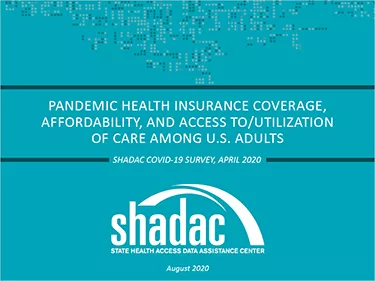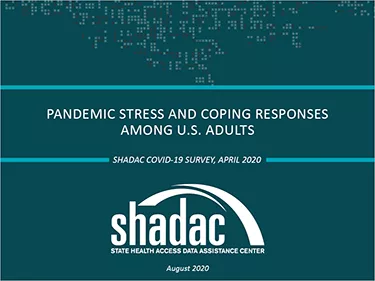Earlier this year, SHADAC published initial results from a two-part survey designed by our researchers to measure the impacts of the novel coronavirus on health care access and insurance coverage, as well as COVID-related worries and coping responses, for adults in the United States. The “SHADAC COVID-19 Survey” was fielded in late April 2020 as part of the AmeriSpeak omnibus survey conducted by NORC at the University of Chicago.*
Survey Topics
The first portion of the survey results focused on recording changes in health insurance coverage, delays in seeking medical care, and issues of access to and affordability of care due to the pandemic as reported by adult respondents.
The second half of the survey results focused on understanding rising stress levels of U.S. adults in response to the COVID-19 pandemic, and how these same individuals did or did not employ a variety of coping responses, such as increased eating, alcohol use, and smoking or vaping and changes in exercise habits, social media use, and communication with family and friends, among others.
Chartbooks and Data Visualizations
In addition to the previously published blogs and issue briefs, SHADAC has created two new chartbooks that provide clear, informative visualizations of responses to a variety of individual survey questions from both sections of the survey.
The chartbooks are again divided by overall category—health insurance coverage and access to/utilization of care in the first and stress and coping responses second—and include breakdowns by age, gender, race/ethnicity, chronic condition, health status, educational attainment, income level, and metropolitan area.
Survey Impacts
Monitoring data on COVID-related worries regarding access, affordability, and utilization of health care, as well as the effects of the pandemic on stress and coping responses for U.S. adults, is important to understanding impacts for both individual and community health. In the first case, worries about affordability or access may cause individuals to delay needed care, which then has the potential to result in health consequences for individuals and increased community spread of the virus. For the second, recognizing the effects of the pandemic on stress levels and the responses chosen to cope with increased stress is important to understanding individual and community mental health status in order to encourage great self- and community care and access to needed support systems.
Acknowledgment: We appreciate contributions to the survey by Sarah Gollust of the University of Minnesota School of Public Health and Brendan Saloner of the Johns Hopkins University Bloomberg School of Public Health.
*The survey was conducted using a mix of phone and online modes from April 24 and 26, 2020, among a nationally representative sample of 1,007 respondents age 18 and older.


